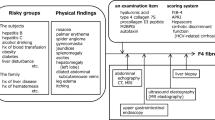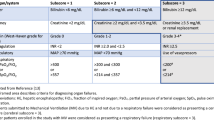Abstract
Background
FOLFOX therapy, a standard treatment for colorectal cancer (CRC), causes a rare, but serious adverse event, hyperammonemia. However, the risk factors of hyperammonemia remain unknown.
Methods
We examined 74 patients who received mFOLFOX6 therapy with or without biologics for CRC between April 2013 and March 2018 in Yaizu City Hospital. Clinicopathological factors were retrospectively reviewed in association with hyperammonemia, and risk factors of hyperammonemia during mFOLFOX6 therapy were analyzed in 32 patients with the available data.
Results
Seven patients developed hyperammonemia, with onset exclusively on day 2 or 3 in the first cycle of therapy. They were treated with branched chain amino acid administration and hydration; however, one patient with stage G4 chronic kidney disease (CKD) died. By multivariate analysis, estimated glomerular filtration rate (eGFR) < 60 mL/min/1.73 m2 was independently associated with hyperammonemia during FOLFOX therapy (odds ratio: 9.0, p = 0.040).
Conclusions
Reduced eGFR is considered a risk factor of developing hyperammonemia during FOLFOX therapy. Serum ammonia levels should be monitored especially during the first cycle of FOLFOX therapy in patients with CKD stage G3 or higher.


Similar content being viewed by others
Data availability
The datasets and analyzed data from the current study are available from the corresponding author on reasonable request.
References
Bray F, Ferlay J, Soerjomataram I et al (2018) Global cancer statistics 2018: GLOBOCAN estimates of incidence and mortality worldwide for 36 cancers in 185 countries. CA Cancer J Clin 68(6):394–424
Rawla P, Sunkara T, Barsouk A (2019) Epidemiology of colorectal cancer: incidence, mortality, survival, and risk factors. Prz Gastroenterol 14(2):89–103
Laurie JA, Moertel CG, Fleming TR et al (1989) Surgical adjuvant therapy of largebowel carcinoma: an evaluation of levamisole and the combination of levamisole and fluorouracil. The North Central Cancer Treatment Group and the Mayo Clinic. J Clin Oncol 7(10):1447–1456
Moertel CG, Fleming TR, Macdonald JS et al (1990) Levamisole and fluorouracil for adjuvant therapy of resected colon carcinoma. N Engl J Med 322:352–358
Moertel CG, Fleming TR, Macdonald JS et al (1995) Fluorouracil plus levamisole as effective adjuvant therapy after resection of stage III colon carcinoma: a final report. Ann Intern Med 122:321–326
André T, Gramont A, Vernerey D et al (2015) Adjuvant fluorouracil, leucovorin, and oxaliplatin in Stage II to III colon cancer: updated 10-year survival and outcomes according to BRAF mutation and mismatch repair status of the MOSAIC study. J Clin Oncol 33(35):4176–4187
Haller DG, Tabernero J, Maroun J et al (2015) Capecitabine plus oxaliplatin compared with fluorouracil/folinic acid as adjuvant therapy for stage III colon cancer: final results of the NO16968 randomized controlled phase III trial. J Clin Oncol 33(32):3733–3740
Kuebler JP, Wieand HS, O’Connell MJ et al (2007) Oxaliplatin combined with weekly bolus fluorouracil and leucovorin as surgical adjuvant chemotherapy for stage II and III colon cancer: results from NSABP C-07. J Clin Oncol 25(16):2198–2204
National Comprehensive Cancer Network (2020) Clinical Practice Guidelines in Oncology. Colon Cancer, version 4.2020. https://www.nccn.org/professionals/physician_gls/pdf/colon.pdf. Accessed July 2020
National Comprehensive Cancer Network (2020) Clinical Practice Guidelines in Oncology. Rectal Cancer, version 6.2020. https://www.nccn.org/professionals/physician_gls/pdf/rectal.pdf. Accessed July 2020.
Van Cutsem E, Cervantes A, Adam R et al (2016) ESMO consensus guidelines for the management of patients with metastatic colorectal cancer. Ann Oncol 27(8):1386–1422
Hashiguchi Y, Muro K, Saito Y et al (2020) Japanese Society for Cancer of the Colon and Rectum (JSCCR) guidelines 2019 for the treatment of colorectal cancer. Int J Clin Oncol 25(1):1–42
De Gramont A, Figer A, Seymour M et al (2000) Leucovorin and fluorouracil with or without oxaliplatin as first-line treatment in advanced colorectal cancer. J Clin Oncol 18(16):2938–2947
Cassidy J, Clarke S, Díaz-Rubio E et al (2008) Randomized phase III study of capecitabine plus oxaliplatin compared with fluorouracil/folinic acid plus oxaliplatin as first-line therapy for metastatic colorectal cancer. J Clin Oncol 26(12):2006–2012
Liaw CC, Wang HM, Wang CH et al (1999) Risk of transient hyperammonemic encephalopathy in cancer patients who received continuous infusion of 5-fluorouracil with the complication of dehydration and infection. Anticancer Drug 10(3):275–281
Yeh KH, Cheng AL (1997) High-dose 5-fluorouracil infusional therapy is associated with hyperammonaemia, lactic acidosis and encephalopathy. Br J Cancer 75(3):464–465
Chang YY, Lin JK, Jiang JK (2012) Oxaliplatin-related hyperammonaemic encephalopathy in a patient with colon cancer. Colorectal Dis 14(12):e821
Ogata T, Satake H, Ogata M et al (2017) Oxaliplatin-induced hyperammonemic encephalopathy in a patient with metastatic pancreatic cancer: a case report. Case Rep Oncol 10(3):885–889
Tournigand C, André T, Achille E et al (2004) FOLFIRI followed by FOLFOX6 or the reverse sequence in advanced colorectal cancer: a randomized GERCOR study. J Clin Oncol 22(2):229–237
Amin MB, Edge S, Greene F et al (2017) AJCC cancer staging manual, 8th edn. Springer, New York
Matoori S, Leroux JC (2015) Recent advances in the treatment of hyperammonemia. Adv Drug Deliv Rev 90:55–68
U.S. Department of Health and Human Services, National Institutes of Health National Cancer Institute (2017) Common Terminology Criteria for Adverse Events (CTCAE) Version 5.0. https://ctep.cancer.gov/protocoldevelopment/electronic_applications/docs/CTCAE_v5_Quick_Reference_5x7.pdf
Inker LA, Astor BC, Fox CH et al (2014) KDOQI US commentary on the 2012 KDIGO clinical practice guideline for the evaluation and management of CKD. Am J Kidney Dis 63(5):713–735
Mitani S, Kadowaki S, Komori A et al (2017) Acute hyperammonemic encephalopathy after fluoropyrimidine-based chemotherapy, a case series and review of the literature. Medicine 96(22):e6874
Boilève A, Thomas L, Lillo-Le Louët A et al (2020) 5-Fluorouracil-induced hyperammonaemic encephalopathy: a French national survey. Eur J Cancer 129:32–40
Ihoriya H, Yamamoto H, Yamada T et al (2018) Hyperammonemic encephalopathy in a patient receiving fluorouracil/oxaliplatin chemotherapy. Clin Case Rep 6(4):603–605
Koenig H, Patel A (1970) Biochemical basis for fluorouracil neurotoxicity. Arch Neurol 23(2):155
Gourdier I, Del Rio M, Crabbé L et al (2002) Drug specific resistance to oxaliplatin is associated with apoptosis defect in a cellular model of colon carcinoma. FEBS Lett 529(2–3):232–236
Rixe O, Ortuzar W, Alveraz M et al (1996) Oxaliplatin, tetraplatin, cisplatin, and carboplatin: spectrum of activity in drug-resistant cell lines and in the cell lines of the national cancer institute’s anticancer drug screen panel. Biochem Pharmacol 52(12):1855–1865
Takimoto CH, Graham MA, Lockwood G et al (2007) Oxaliplatin pharmacokinetics and pharmacodynamics in adult cancer patients with impaired renal function. Clin Cancer Res 13(16):4832–4839
Takimoto CH, Remick SC, Sharma S et al (2003) Administration of oxaliplatin to patients with renal dysfunction: a preliminary report of the national cancer institute organ dysfunction working group. Semin Oncol 30(4 Suppl 15):20–25
Chahin M, Krishnan N, Chhatrala H et al (2020) A 5-fluorouracil-induced hyperammonemic encephalopathy challenged with capecitabine. Case Rep Oncol Med 2020:4216752
Author information
Authors and Affiliations
Contributions
KO, KH, YI, YK, YI, NK, RK and TH developed the study design and concept, retrieved the data of patients and carried out the analysis. KO, HN, KH, YI, KK, KS, KM, TH and SI participated in writing and revising the manuscript critically. All authors read and approved the final manuscript.
Corresponding author
Ethics declarations
Conflict of interest
The authors declare that they have no conflict of interest.
Ethical approval
This study was approved by the Ethics Committees of Yaizu City Hospital (No. 239).
Additional information
Publisher's Note
Springer Nature remains neutral with regard to jurisdictional claims in published maps and institutional affiliations.
About this article
Cite this article
Okamoto, K., Nozawa, H., Hongo, K. et al. Risk factors of mFOLFOX6-induced hyperammonemia in patients with colorectal cancer: an observational study. Int J Clin Oncol 26, 1477–1484 (2021). https://doi.org/10.1007/s10147-021-01932-w
Received:
Accepted:
Published:
Issue Date:
DOI: https://doi.org/10.1007/s10147-021-01932-w




